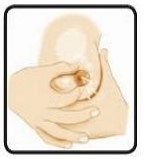Antenatal Colostrum Collection
Please note, this page is printable by selecting the normal print options on your computer.
Why is colostrum important?
The first milk your breasts produce is called colostrum. Colostrum contains important antibodies and nutrients for a newborn baby. It is high in carbohydrates and protein but low in fat. It will help the baby pass his or her first stools, which is important to prevent jaundice. Jaundice is a common, usually harmless, condition in newborn babies which can cause yellowing of the skin and the whites of their eyes. If you suspect jaundice is present, please inform your midwife.
The antibodies contained in colostrum allows the mother to pass on immunity to her baby, from the many germs that could otherwise harm them. There is a much higher concentration of these antibodies in colostrum, than there is in mature breast milk.
Colostrum is very high in vitamins, minerals, antioxidants and contains nutrients that a newborn needs for healthy brain, heart, and central nervous system development. It comes in very small quantities for newborn babies. It is also perfectly designed to line your baby’s gut and be absorbed, laying the groundwork for future healthy development and proper digestion.
Research also shows that colostrum helps to stabilise blood sugar levels in babies which is very helpful particularly in those babies of mothers who had diabetes in pregnancy or babies at risk of low blood sugar levels.
Getting off to the best start
Colostrum is produced from about sixteen weeks of pregnancy onwards and your breasts may leak from 28 weeks. The amount of colostrum will vary from person to person and can range from nothing initially, to a few drops, progressing to a teaspoonful or more.
Learning to express colostrum can increase confidence and ability to breastfeed, especially in situations where the first feed may be delayed or in the following circumstances:
- Service users with diabetes
- Multiple pregnancy (twins or triplets)
- Service users with breast abnormalities or previous breast surgery
- Service users with pregnancy induced high blood pressure and /or taking blood pressure medication
- Previous negative experience/difficulty with breast feeding
- Planned caesarean/induced birth especially if your baby is going to be born early
- Babies who are thought to be small or are expected to on a low centile at birth
Expressing colostrum can be done safely from 36 weeks of pregnancy as long as you have no risks of bleeding in pregnancy and you are not at risk of pre-term birth.
How to hand express
- Have a clean sterilised container to hand before you start, such as syringe or bottle. Ensure you are comfortable and then gently massage your breasts for at least 10 minutes.
- Cup your breast and gently move your fingers back away from the end of the nipple to where the texture of your breast feels different.
- Using your thumb and the rest of your fingers in a C shape, gently squeeze this area.
- Gently compress your breast between your fingers and release the pressure.
Repeat the process, building up a rhythm.
- Avoid sliding your fingers over the skin. Hand expression shouldn’t hurt.
- At first, only small drops will appear but keep going as it will help build up your supply. With practice and a little more time, milk will flow freely.
- When the flow stops after adjusting your hand position,
Swap to the other breast.
- If the milk doesn’t flow, try moving your fingers slightly towards the nipple or further away, and try a gentle breast massage.


How often can I express?
Before you have your baby and in the first few days after birth only use hand expression. You could practise in the bath or shower as relaxation and warmth often helps with expressing. It is very normal to get nothing initially, even learning how to hand express will get you off to a great start for when you have your baby.
Why hand express rather than use a pump?
You will only be expressing very small amounts of colostrum, so using the pump at this stage will be impractical and may not be as effective. Before your baby is born, you will only need to express until you have a few drops of colostrum. By expressing up to three times a day, you can express enough for baby’s first feeds. Babies require no more than a teaspoon of colostrum. Their tummies at birth hold small volumes of approximately 5ml.
What do I need?
Ask your midwife for a colostrum collection kit at around 36 weeks. This will contain some 1ml sterile oral syringes, labels, hand expressing guide. It is extremely important to label EVERY syringe with your name, hospital number, date and time of the expression.
Storage
Breast milk can be stored in the fridge for up to 5 days at 4°C or lower. It should be stored at the back of the fridge, never in the door. Breast milk can be stored for up to 6 months in a freezer. Any breast milk expressed in the antenatal period should be stored in the freezer.
When you are in labour, bring a small amount of your stored colostrum (no more than 5 syringes) with you, in a cool bag with ice packs. The Midwife will store it in the milk fridge until it is required. Please ensure it is correctly labelled as per guidance.
For more advice and video demonstration, please follow this link: https://www.unicef.org.uk/babyfriendly/baby–friendly–resources/breastfeedingresources/hand–expression–video/
